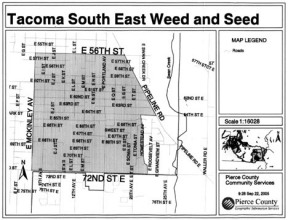City leaders are supporting a plan to pursue federal funds aimed to revitalize and rehabilitate an area of South East Tacoma that many residents complain is overrun by drug dealers, gang violence, and prostitution, according to a discussion Sept. 22 at City Hall.
The decision was made during a meeting yesterday of the Tacoma City Council Public Safety and Human Services committee, which voted unanimously to support the community- and law enforcement-based effort to apply for so-called Weed and Seed designation and funds from the Department of Justice (DOJ).
This is an easy sale for me, said Councilmember Mike Lonergan, the committee vice chair, who commented that his two sons live in the neighborhood and frequently experience some of the problems that funding from the Weed and Seed program would address. Both of my sons have heard gunfire, and they get on the floor when they hear it.
Its encouraging that this is starting with a base of citizens like this who are so involved, said Councilmember Julie Anderson.
Finding support for the plan is easy. Securing the funds, however, is difficult, according to Tareena Torres, the citys human service contract specialist. There are 330 Weed and Seed sites in the country, says Torres, who is facilitating the community-based effort by applying for the program on behalf of the city. Its a very competitive process.
Weed and Seed has been described as an innovative and comprehensive multiagency approach to law enforcement, crime prevention, and community revitalization that aims to prevent, control, and reduce violent crime, drug abuse, and gang activity in designated high-crime neighborhoods across the country.
The programs name is derived from a two-part approach where law enforcement agencies and prosecutors cooperate in “weeding out” violent criminals and drug abusers, and public agencies and community-based private organizations collaborate to “seed” human services, including prevention, intervention, treatment, and neighborhood restoration programs. A community-oriented policing component bridges the weeding and seeding elements.
The Weed and Seed hallmark is that it blends law enforcement; community policing; drug prevention, intervention, and treatment; and neighborhood restoration in order to fight crime and improve neighborhoods.
According to Torres, the Weed and Seed application process is twofold. First, the Executive Office for Weed and Seed must designate a particular location as a Weed and Seed site, based upon applications submitted from throughout the United States. Funds are then administered by DOJ Office of Justice Programs Community Capacity Development Office over a five-year period. Each site is eligible to apply for up to $225,000 per year.
Currently, Tacoma has one Weed and Seed site that encompasses the Jennie Reed, Lincoln, Hilltop and McKinley neighborhoods. The site was created in 2002 and, according to Torres, transformed the neighborhoods. It changed the way the city, community, and police officers work together to make a better place, said Torres.
Another site in nearby Lakewood was created in 1999.
According to Torres, the application is due at the end of October, and Weed and Seed sites will be recognized next spring. If South East Tacoma receives the designation, the city will apply for funds during summer 2006, and funds will be administered the following year.
The city is looking to an area bordered by E. 56th St., Pipeline Rd., 72nd St. E., and E. McKinley Ave. as its Weed and Site site.
This is by no means a slam dunk, said John Briehl, director of the citys human rights and human services department.
Indeed, South East Tacoma residents are busy letting city leaders know how badly their neighborhood needs a Weed and Seed program.
South East Tacoma resident Tony Martin described the crime that he has witnessed in his neighborhood. The area is seeing more gang violence, prostitution, and drive-by violent activity, said Martin. He said the areas hot spot for crime is on Pipeline and 57th.
Tacoma Police Lt. Mike Aki told the committee that South East Tacoma has been identified by local law enforcement as the worst crime area in the city.
What Im picking up from people in the area is that the stories are all the same, added Jerry Paulson, a member of the Eastside Community Action Team. According to Paulsen, Weed and Seed efforts in the Hilltop neighborhood have forced criminal activities to South East Tacoma. The coordination and organization in the Hilltop has forced people to South East Tacoma. Now were seeing things on the eastside that we used to see in the Hilltop. But with the help of this federal grant, we can make an impact.
Still, Paulsen cautioned that the program might simply move the problem to another part of the city.
Councilmember Lonergan agreed. Thats the age-old problem, he added.








